Deck 24: Supplement G Acceptance Sampling Plans
Question
Question
Question
Question
Question
Question
Question
Question
Question
Question
Question
Question
Question
Question
Question
Question
Question
Question
Question
Question
Question
Question
Question
Question
Question
Question
Question
Question
Question
Question
Question
Question
Question
Question
Question
Question
Question
Question
Question
Question
Question
Question
Question
Question
Question
Question
Question
Question
Question
Question
Question
Question
Question
Question
Question
Question
Question
Question
Question
Question
Question
Question
Question
Question
Question
Question
Question
Question
Question
Question
Question
Question
Question
Question
Question
Question
Question
Question
Question
Question

Unlock Deck
Sign up to unlock the cards in this deck!
Unlock Deck
Unlock Deck
1/87
Play
Full screen (f)
Deck 24: Supplement G Acceptance Sampling Plans
1
Discuss the two incorrect conclusions that can be made when using acceptance sampling.
The two incorrect conclusions are to reject a lot of good product and to accept a lot of defective product. The chance of rejecting a lot of good product is called the producer's risk or a type I error, and is usually set at 5 percent. The chance of accepting a defective lot is called consumer's risk or a type II error, and is usually set at 10 percent.
2
Which of the following is an example of a type I error?
A) buying a carton of eggs at the store and discovering that one was broken
B) releasing a guilty defendant
C) returning your computer for warranty repair when the fault was caused by user error
D) passing defective materials from a supplier into your processes to keep your workers busy
A) buying a carton of eggs at the store and discovering that one was broken
B) releasing a guilty defendant
C) returning your computer for warranty repair when the fault was caused by user error
D) passing defective materials from a supplier into your processes to keep your workers busy
C
3
________ is an inspection procedure used to determine whether to accept or reject a specific quantity of material.
Acceptance sampling
4
A double-sampling plan is usually less expensive than a single-sampling plan if the lot has a high number of defectives.

Unlock Deck
Unlock for access to all 87 flashcards in this deck.
Unlock Deck
k this deck
5
________ is the worst level of quality that the customer can tolerate.

Unlock Deck
Unlock for access to all 87 flashcards in this deck.
Unlock Deck
k this deck
6
________ is the quality level desired by the consumer.

Unlock Deck
Unlock for access to all 87 flashcards in this deck.
Unlock Deck
k this deck
7
Acceptance sampling is an inspection procedure used to determine whether to accept or reject a specific quantity of material.

Unlock Deck
Unlock for access to all 87 flashcards in this deck.
Unlock Deck
k this deck
8
Which of the following is an example of a type II error?
A) convicting an innocent defendant
B) returning your "dead" stereo for warranty repair when its malfunction was caused by it not being plugged in
C) halting production to adjust a machine when your process was actually in control
D) eating food that has spoiled
A) convicting an innocent defendant
B) returning your "dead" stereo for warranty repair when its malfunction was caused by it not being plugged in
C) halting production to adjust a machine when your process was actually in control
D) eating food that has spoiled

Unlock Deck
Unlock for access to all 87 flashcards in this deck.
Unlock Deck
k this deck
9
A double-sampling plan is usually less expensive than a single-sampling plan if the lot has a low number of defectives.

Unlock Deck
Unlock for access to all 87 flashcards in this deck.
Unlock Deck
k this deck
10
A double-sampling plan requires two sample sizes and two acceptance numbers.

Unlock Deck
Unlock for access to all 87 flashcards in this deck.
Unlock Deck
k this deck
11
Lot tolerance proportion defective (LTPD) can be defined as the:
A) quality level desired by the consumer.
B) worst quality level the consumer can tolerate.
C) probability of rejecting a good lot (i.e., when a lot is, in fact, acceptable to the consumer).
D) probability of accepting a bad lot (i.e., when a lot is, in fact, not acceptable to the consumer).
A) quality level desired by the consumer.
B) worst quality level the consumer can tolerate.
C) probability of rejecting a good lot (i.e., when a lot is, in fact, acceptable to the consumer).
D) probability of accepting a bad lot (i.e., when a lot is, in fact, not acceptable to the consumer).

Unlock Deck
Unlock for access to all 87 flashcards in this deck.
Unlock Deck
k this deck
12
What is the basic idea of incoming inspection? Why does a producer perform it?

Unlock Deck
Unlock for access to all 87 flashcards in this deck.
Unlock Deck
k this deck
13
Acceptable quality level can be defined as the:
A) quality level desired by the consumer.
B) worst quality level the consumer can tolerate.
C) probability of rejecting a good lot (i.e., when a lot is, in fact, acceptable to the consumer).
D) probability of accepting a bad lot (i.e., when a lot is, in fact, not acceptable to the consumer).
A) quality level desired by the consumer.
B) worst quality level the consumer can tolerate.
C) probability of rejecting a good lot (i.e., when a lot is, in fact, acceptable to the consumer).
D) probability of accepting a bad lot (i.e., when a lot is, in fact, not acceptable to the consumer).

Unlock Deck
Unlock for access to all 87 flashcards in this deck.
Unlock Deck
k this deck
14
________ is the risk that the sampling plan will fail to verify an acceptable lot's quality and thus reject it-a type I error.

Unlock Deck
Unlock for access to all 87 flashcards in this deck.
Unlock Deck
k this deck
15
The lot tolerance proportion defective (LTPD) is the customer's desired level of quality.

Unlock Deck
Unlock for access to all 87 flashcards in this deck.
Unlock Deck
k this deck
16
A single-sampling plan has n = 200 and c = 6. A sample is taken and five items are found to be defective. What should be done?
A) Another sample should be taken.
B) The lot should be rejected.
C) The lot should be accepted.
D) The five items should be repaired, and then the entire lot should be accepted.
A) Another sample should be taken.
B) The lot should be rejected.
C) The lot should be accepted.
D) The five items should be repaired, and then the entire lot should be accepted.

Unlock Deck
Unlock for access to all 87 flashcards in this deck.
Unlock Deck
k this deck
17
________ is the risk that a lot with LTPD will be accepted-a type II error.

Unlock Deck
Unlock for access to all 87 flashcards in this deck.
Unlock Deck
k this deck
18
As more firms initiate total quality management systems, the need for acceptance sampling will increase.

Unlock Deck
Unlock for access to all 87 flashcards in this deck.
Unlock Deck
k this deck
19
A sequential sampling plan generally lowers the ANI.

Unlock Deck
Unlock for access to all 87 flashcards in this deck.
Unlock Deck
k this deck
20
Discuss producer's risk and consumer's risk.

Unlock Deck
Unlock for access to all 87 flashcards in this deck.
Unlock Deck
k this deck
21
A double-sampling plan has n₁ = 50, n₂ = 100, c₁ = 2, and c₂ = 4. Suppose on the first sample, one defective item was discovered. What should be done?
A) Reject the entire lot.
B) Take a second sample of 100 units.
C) Accept the entire lot.
D) Repair the defective units, and accept the entire lot.
A) Reject the entire lot.
B) Take a second sample of 100 units.
C) Accept the entire lot.
D) Repair the defective units, and accept the entire lot.

Unlock Deck
Unlock for access to all 87 flashcards in this deck.
Unlock Deck
k this deck
22
In general, a sequential sampling strategy will require a lower number of items be inspected if the actual percentage of defectives in the lot is ________.

Unlock Deck
Unlock for access to all 87 flashcards in this deck.
Unlock Deck
k this deck
23
The distance between 1.0 and where the AQL intersects the OC curve is the value β (Beta).

Unlock Deck
Unlock for access to all 87 flashcards in this deck.
Unlock Deck
k this deck
24
A double-sampling plan has n₁ = 50, n₂ = 100, c₁ = 2, and c₂ = 4. Suppose on the first sample, five defectives were discovered. How many total items will be inspected before a decision is reached?
A) 50
B) 100
C) 150
D) This cannot be determined with the information provided.
A) 50
B) 100
C) 150
D) This cannot be determined with the information provided.

Unlock Deck
Unlock for access to all 87 flashcards in this deck.
Unlock Deck
k this deck
25
For a given AQL and LTPD, which one of the following statements about the single-sampling plan is True?
A) If c stays constant but n is increased, both the producer's risk and the consumer's risk will increase.
B) If c stays constant but n is increased, both the producer's risk and the consumer's risk will decrease.
C) If n stays constant but c is increased, the producer's risk will decrease and the consumer's risk will increase.
D) If n stays constant but c is increased, the producer's risk will increase and the consumer's risk will decrease.
A) If c stays constant but n is increased, both the producer's risk and the consumer's risk will increase.
B) If c stays constant but n is increased, both the producer's risk and the consumer's risk will decrease.
C) If n stays constant but c is increased, the producer's risk will decrease and the consumer's risk will increase.
D) If n stays constant but c is increased, the producer's risk will increase and the consumer's risk will decrease.

Unlock Deck
Unlock for access to all 87 flashcards in this deck.
Unlock Deck
k this deck
26
A double-sampling plan has a lower ________ than a single-sampling plan.

Unlock Deck
Unlock for access to all 87 flashcards in this deck.
Unlock Deck
k this deck
27
The management of a company wishes to develop a new acceptance sampling plan that keeps acceptable quality level, lot tolerance proportion defective, and c constant. If the sample size (n) is increased, compared to the prior plan, which of the following is True?
A) α increases
B) α decreases
C) β increases
D) α and β increase
A) α increases
B) α decreases
C) β increases
D) α and β increase

Unlock Deck
Unlock for access to all 87 flashcards in this deck.
Unlock Deck
k this deck
28
Which of the following statements is True?
A) Sequential-sampling plans are preferred to single-sampling plans because the average number of items inspected is generally lower.
B) With a sequential-sampling plan, each time an item is inspected, a decision is made to accept or reject a lot.
C) With a sequential-sampling plan, sampling continues until the lot is rejected.
D) Sequential-sampling plans are defined by four parameters: n₁, n₂, c₁, c₂.
A) Sequential-sampling plans are preferred to single-sampling plans because the average number of items inspected is generally lower.
B) With a sequential-sampling plan, each time an item is inspected, a decision is made to accept or reject a lot.
C) With a sequential-sampling plan, sampling continues until the lot is rejected.
D) Sequential-sampling plans are defined by four parameters: n₁, n₂, c₁, c₂.

Unlock Deck
Unlock for access to all 87 flashcards in this deck.
Unlock Deck
k this deck
29
Describe the process of a single-sampling plan.

Unlock Deck
Unlock for access to all 87 flashcards in this deck.
Unlock Deck
k this deck
30
Which one of the following alternatives will reduce the producer's risk for a given AQL and LTPD?
A) Reduce n and keep c constant.
B) Increase n and keep c constant.
C) Increase n and reduce c.
D) Increase alpha.
A) Reduce n and keep c constant.
B) Increase n and keep c constant.
C) Increase n and reduce c.
D) Increase alpha.

Unlock Deck
Unlock for access to all 87 flashcards in this deck.
Unlock Deck
k this deck
31
Describe the process of a double-sampling plan.

Unlock Deck
Unlock for access to all 87 flashcards in this deck.
Unlock Deck
k this deck
32
If you were interested in minimizing the average number of items inspected, which type of sampling plan would you choose? Why?

Unlock Deck
Unlock for access to all 87 flashcards in this deck.
Unlock Deck
k this deck
33
A double-sampling plan has n₁ = 50, n₂ = 100, c₁ = 2, and c₂ = 4. Suppose the first sample revealed two defectives. What should be done?
A) Reject the entire lot.
B) Take a second sampling of 100 units.
C) Accept the entire lot.
D) Repeat the tests on the first sample.
A) Reject the entire lot.
B) Take a second sampling of 100 units.
C) Accept the entire lot.
D) Repeat the tests on the first sample.

Unlock Deck
Unlock for access to all 87 flashcards in this deck.
Unlock Deck
k this deck
34
Which one of the following will increase the consumer's risk?
A) Decrease sample size and hold constant the number of defective items in a sample.
B) Decrease the acceptable number of defective items in a sample and hold constant the sample size.
C) Increase the sample size and decrease the acceptable number of defective items in a sample.
D) Decrease the acceptable quality level and hold constant both sample size and the acceptable number of defective items in a sample.
A) Decrease sample size and hold constant the number of defective items in a sample.
B) Decrease the acceptable number of defective items in a sample and hold constant the sample size.
C) Increase the sample size and decrease the acceptable number of defective items in a sample.
D) Decrease the acceptable quality level and hold constant both sample size and the acceptable number of defective items in a sample.

Unlock Deck
Unlock for access to all 87 flashcards in this deck.
Unlock Deck
k this deck
35
The average outgoing quality (AOQ) is:
A) the average number of good units produced per hour.
B) the expected proportion of defects a sampling plan will allow.
C) the level of quality desired by the customer.
D) the worst level of quality tolerated by the consumer.
A) the average number of good units produced per hour.
B) the expected proportion of defects a sampling plan will allow.
C) the level of quality desired by the customer.
D) the worst level of quality tolerated by the consumer.

Unlock Deck
Unlock for access to all 87 flashcards in this deck.
Unlock Deck
k this deck
36
Which one of the following actions will decrease the producer's risk?
A) Increase n and keep c constant.
B) Decrease n and keep c constant.
C) Keep n constant and decrease c.
D) Increase n and decrease c.
A) Increase n and keep c constant.
B) Decrease n and keep c constant.
C) Keep n constant and decrease c.
D) Increase n and decrease c.

Unlock Deck
Unlock for access to all 87 flashcards in this deck.
Unlock Deck
k this deck
37
Which one of the following alternatives will reduce the consumer's risk for a given AQL and LTPD?
A) Reduce n and keep c constant.
B) Increase n and keep c constant.
C) Reduce n and increase c.
D) Increase beta.
A) Reduce n and keep c constant.
B) Increase n and keep c constant.
C) Reduce n and increase c.
D) Increase beta.

Unlock Deck
Unlock for access to all 87 flashcards in this deck.
Unlock Deck
k this deck
38
Increasing c while holding n constant decreases the producer's risk and increases the consumer's risk.

Unlock Deck
Unlock for access to all 87 flashcards in this deck.
Unlock Deck
k this deck
39
A(n) ________ is when the consumer randomly selects items from the lot and inspects them one by one.

Unlock Deck
Unlock for access to all 87 flashcards in this deck.
Unlock Deck
k this deck
40
An operating characteristic curve is a plot of the probability of accepting the lot against the proportion defectives.

Unlock Deck
Unlock for access to all 87 flashcards in this deck.
Unlock Deck
k this deck
41
Why is an operating-characteristic (OC) curve useful?

Unlock Deck
Unlock for access to all 87 flashcards in this deck.
Unlock Deck
k this deck
42
An item is purchased with one surface polished to a specified finish quality. From each incoming shipment, a sample of items is randomly selected and the polished surface of each sample item is compared with a standard and judged to be either acceptable or unacceptable. The following parameters have been established: AQL = 0.02, = 0.05, LTPD = 0.09, and = 0.10. Table G.1 is appended to this exam. What are the sample size and the acceptance number?
A) n = 89, c = 4
B) n = 39, c = 1
C) n = 43, c = 1
D) n = 237, c = 15
A) n = 89, c = 4
B) n = 39, c = 1
C) n = 43, c = 1
D) n = 237, c = 15

Unlock Deck
Unlock for access to all 87 flashcards in this deck.
Unlock Deck
k this deck
43
A single-sampling plan by attributes is needed for a purchased component. Given the following information, what is the producer's risk? Table G.1 is appended to this exam. Sample size = 75
Acceptance number (c) = 2
Acceptance quality level (AQL) = 0.01
Lot tolerance proportion defective (LTPD) = 0.04
A) )01
B) )02
C) )03
D) )04
Acceptance number (c) = 2
Acceptance quality level (AQL) = 0.01
Lot tolerance proportion defective (LTPD) = 0.04
A) )01
B) )02
C) )03
D) )04

Unlock Deck
Unlock for access to all 87 flashcards in this deck.
Unlock Deck
k this deck
44
A manufacturer wants a sampling plan in which AQL = 0.02, LPTD = 0.12, α = 0.05, and β = 0.10. Which of the following values for n and c best satisfy these specifications? Table G.1 is appended to this exam.
A) n = 54, c = 3
B) n = 100, c = 2
C) n = 200, c = 1
D) n = 162, c = 0
A) n = 54, c = 3
B) n = 100, c = 2
C) n = 200, c = 1
D) n = 162, c = 0

Unlock Deck
Unlock for access to all 87 flashcards in this deck.
Unlock Deck
k this deck
45
A single-sampling plan by attributes is needed for a purchased component. Given the following information, what is the consumer's risk? Table G.1 is appended to this exam. Sample size = 50
Acceptance number (c) = 3
Acceptance quality level (AQL) = 0.01
Lot tolerance proportion defective (LTPD) = 0.04
A) greater than or equal to 0 but less than or equal to 0.25
B) greater than 0.25 but less than or equal to 0.50
C) greater than 0.50 but less than or equal to 0.75
D) greater than 0.75 but less than or equal to 1.00
Acceptance number (c) = 3
Acceptance quality level (AQL) = 0.01
Lot tolerance proportion defective (LTPD) = 0.04
A) greater than or equal to 0 but less than or equal to 0.25
B) greater than 0.25 but less than or equal to 0.50
C) greater than 0.50 but less than or equal to 0.75
D) greater than 0.75 but less than or equal to 1.00

Unlock Deck
Unlock for access to all 87 flashcards in this deck.
Unlock Deck
k this deck
46
A single-sampling plan by attributes is needed for a purchased component. Given the following information, what is the producer's risk? Table G.1 is appended to this exam. Sample size = 75
Acceptance number (c) = 3
Acceptance quality level (AQL) = 0.01
Lot tolerance proportion defective (LTPD) = 0.04
A) )007
B) )008
C) )009
D) )010
Acceptance number (c) = 3
Acceptance quality level (AQL) = 0.01
Lot tolerance proportion defective (LTPD) = 0.04
A) )007
B) )008
C) )009
D) )010

Unlock Deck
Unlock for access to all 87 flashcards in this deck.
Unlock Deck
k this deck
47
If the sample size is increased and the acceptance level is unchanged, the OC curve will have a higher consumer's risk.

Unlock Deck
Unlock for access to all 87 flashcards in this deck.
Unlock Deck
k this deck
48
A single-sampling plan by attributes is needed for a purchased component. Table G.1 is appended to this exam.
Sample size = 80
Acceptance number (c) = 1
Acceptance quality level (AQL) = 0.02
Lot tolerance proportion defective (LTPD) = 0.06
Given the preceding information, draw the OC curve for this plan.
Sample size = 80
Acceptance number (c) = 1
Acceptance quality level (AQL) = 0.02
Lot tolerance proportion defective (LTPD) = 0.06
Given the preceding information, draw the OC curve for this plan.

Unlock Deck
Unlock for access to all 87 flashcards in this deck.
Unlock Deck
k this deck
49
Use Table G.1 for the following question. What is the acceptance number of a single-sampling plan if n = 400, AQL = 0.002, and α= 0.01?
A) c = 0
B) c = 1
C) c = 2
D) c = 3
A) c = 0
B) c = 1
C) c = 2
D) c = 3

Unlock Deck
Unlock for access to all 87 flashcards in this deck.
Unlock Deck
k this deck
50
If the sample size is increased and the acceptance level is unchanged, the OC curve will have a slope that is more negative.

Unlock Deck
Unlock for access to all 87 flashcards in this deck.
Unlock Deck
k this deck
51
An ideal OC curve is shaped like a ________.

Unlock Deck
Unlock for access to all 87 flashcards in this deck.
Unlock Deck
k this deck
52
A graph that demonstrates how well a sampling plan distinguishes between shipments that should be accepted and shipments that should be rejected is a(n) ________.

Unlock Deck
Unlock for access to all 87 flashcards in this deck.
Unlock Deck
k this deck
53
A single-sampling plan by attributes is needed for a purchased component. Given the following information, what is the consumer's risk? Table G.1 is appended to this exam. Sample size = 75
Acceptance number (c) = 2
Acceptance quality level (AQL) = 0.01
Lot tolerance proportion defective (LTPD) = 0.05
A) )25
B) )27
C) )29
D) )31
Acceptance number (c) = 2
Acceptance quality level (AQL) = 0.01
Lot tolerance proportion defective (LTPD) = 0.05
A) )25
B) )27
C) )29
D) )31

Unlock Deck
Unlock for access to all 87 flashcards in this deck.
Unlock Deck
k this deck
54
Relative to an acceptance sampling plan, what is the net effect of increasing n while holding c constant?

Unlock Deck
Unlock for access to all 87 flashcards in this deck.
Unlock Deck
k this deck
55
A single-sampling plan by attributes is needed for a purchased component. Given the following information, what is the consumer's risk? Table G.1 is appended to this exam. Sample size = 100
Acceptance number (c) = 1
Acceptance quality level (AQL) = 0.01
Lot tolerance proportion defective (LTPD) = 0.05
A) )028
B) )033
C) )037
D) )041
Acceptance number (c) = 1
Acceptance quality level (AQL) = 0.01
Lot tolerance proportion defective (LTPD) = 0.05
A) )028
B) )033
C) )037
D) )041

Unlock Deck
Unlock for access to all 87 flashcards in this deck.
Unlock Deck
k this deck
56
A single-sampling plan by attributes is needed for a purchased component. Given the following information, what is the consumer's risk? Table G.1 is appended to this exam. Sample size = 100
Acceptance number (c) = 1
Acceptance quality level (AQL) = 0.02
Lot tolerance proportion defective (LTPD) = 0.07
A) )003
B) )004
C) )005
D) )006
Acceptance number (c) = 1
Acceptance quality level (AQL) = 0.02
Lot tolerance proportion defective (LTPD) = 0.07
A) )003
B) )004
C) )005
D) )006

Unlock Deck
Unlock for access to all 87 flashcards in this deck.
Unlock Deck
k this deck
57
A single-sampling plan by attributes is needed for a purchased component. Given the following information, what is the consumer's risk? Table G.1 is appended to this exam. Sample size = 75
Acceptance number (c) = 3
Acceptance quality level (AQL) = 0.01
Lot tolerance proportion defective (LTPD) = 0.05
A) )46
B) )48
C) )50
D) )52
Acceptance number (c) = 3
Acceptance quality level (AQL) = 0.01
Lot tolerance proportion defective (LTPD) = 0.05
A) )46
B) )48
C) )50
D) )52

Unlock Deck
Unlock for access to all 87 flashcards in this deck.
Unlock Deck
k this deck
58
A company is developing an acceptance sampling plan to monitor quality. The acceptable quality level (AQL) is 0.01, and a sampling plan having c = 5 is being considered. If a producer's risk of 0.03 is desired, what should be the sample size? Table G.1 is appended to this exam.
A) less than or equal to 25
B) more than 25 but less than or equal to 175
C) more than 175 but less than or equal to 325
D) more than 325
A) less than or equal to 25
B) more than 25 but less than or equal to 175
C) more than 175 but less than or equal to 325
D) more than 325

Unlock Deck
Unlock for access to all 87 flashcards in this deck.
Unlock Deck
k this deck
59
Use Table G.1 for the following question. What is the acceptance number of a single-sampling plan if n = 300, LPTD = 0.02, and = 0.15?
A) c = 0
B) c = 1
C) c = 2
D) c = 3
A) c = 0
B) c = 1
C) c = 2
D) c = 3

Unlock Deck
Unlock for access to all 87 flashcards in this deck.
Unlock Deck
k this deck
60
A company wants to develop an acceptance sampling plan that keeps the producer's risk at 0.03 or less and the customer's risk at 0.10 or less. The acceptable quality level (AQL) is 0.01, and the lot tolerance proportion defective (LTPD) has been set at 0.10. Which one of the following plans gives us the desired protection? Table G.1 is appended to this exam.
A) c = 3, n = 190
B) c = 2, n = 54
C) c = 1, n = 30
D) c = 1, n = 20
A) c = 3, n = 190
B) c = 2, n = 54
C) c = 1, n = 30
D) c = 1, n = 20

Unlock Deck
Unlock for access to all 87 flashcards in this deck.
Unlock Deck
k this deck
61
This OC curve represents a sampling plan developed for a lot size of 1,000, a sample size of 15, and an acceptance number of 2. The probability of acceptance for each of the first six points appears next to the plotted point. What is the average outgoing quality for an incoming fraction defective of 0.25? 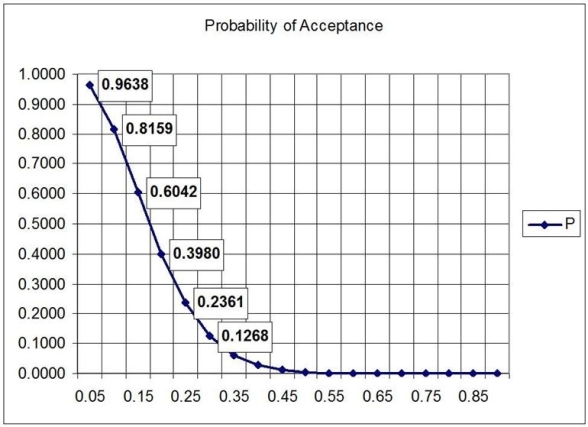
A) less than 0.045
B) greater than or equal to 0.045 but less than 0.055
C) greater than or equal to 0.055 but less than 0.065
D) greater than or equal to 0.065

A) less than 0.045
B) greater than or equal to 0.045 but less than 0.055
C) greater than or equal to 0.055 but less than 0.065
D) greater than or equal to 0.065

Unlock Deck
Unlock for access to all 87 flashcards in this deck.
Unlock Deck
k this deck
62
This OC curve represents a sampling plan developed for a lot size of 1,000, a sample size of 15, and an acceptance number of 2. The probability of acceptance for each of the first six points appears next to the plotted point. What incoming fraction defective is associated with the average outgoing quality limit? 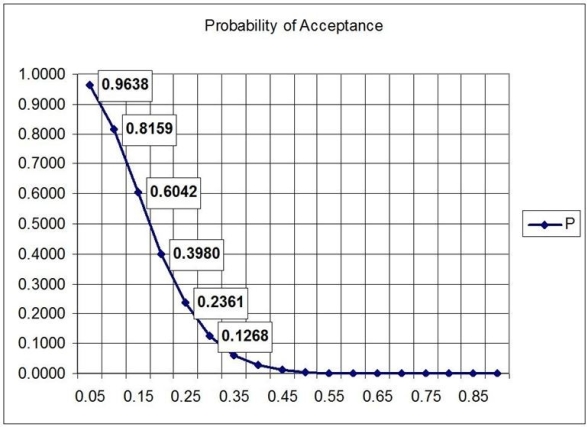
A) 0.10
B) 0.15
C) 0.20
D) 0.25

A) 0.10
B) 0.15
C) 0.20
D) 0.25

Unlock Deck
Unlock for access to all 87 flashcards in this deck.
Unlock Deck
k this deck
63
Champion Cooling Company has developed a sampling plan calling for a sample size of 25 and an acceptance number of 1. The proportion defective and probability of acceptance appear in the table. Floyd Electric, their supplier ships whatever Champion Cooling asks; sometimes the lot size is as small as 30 units and it has been as large as 10,000 units. Champion Cooling decides to stick with what they know, a sample size of 25 and an acceptance number of 1 despite advice to the contrary. Which statement regarding their sampling plan is best? 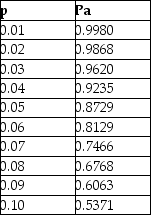
A) The average outgoing quality level will remain constant since the sample size and the acceptance number do not change.
B) The average outgoing quality level will vary as the lot size varies, but the average outgoing quality limit will remain constant.
C) The incoming fraction defective that produces the average outgoing quality limit will remain the same regardless of lot size.
D) The incoming fraction defective that produces the average outgoing quality limit will vary as the lot size varies.

A) The average outgoing quality level will remain constant since the sample size and the acceptance number do not change.
B) The average outgoing quality level will vary as the lot size varies, but the average outgoing quality limit will remain constant.
C) The incoming fraction defective that produces the average outgoing quality limit will remain the same regardless of lot size.
D) The incoming fraction defective that produces the average outgoing quality limit will vary as the lot size varies.

Unlock Deck
Unlock for access to all 87 flashcards in this deck.
Unlock Deck
k this deck
64
A quality manager has established a sampling plan that calls for a sample size of 75 units and an acceptance number of 2. The supplier has agreed to a contract that calls for an AQL of 0.02 and an LTPD of .04. What is the AOQL? Table G.1 is appended to this exam.
A) less than 0.11
B) between 0.11 and 0.14
C) between 0.14 and 0.17
D) greater than 0.17
A) less than 0.11
B) between 0.11 and 0.14
C) between 0.14 and 0.17
D) greater than 0.17

Unlock Deck
Unlock for access to all 87 flashcards in this deck.
Unlock Deck
k this deck
65
A sample of 100 items is randomly selected from a shipment of incoming materials. AQL and LTPD have been established at 0.01 and 0.07, respectively. When four or more defective items are found in a sample, the shipment is rejected. What is the value of α? Table G.1 is appended to this exam.
A) less than or equal to 0.04
B) greater than 0.04 but less than or equal to 0.06
C) greater than 0.06 but less than or equal to 0.08
D) greater than 0.08
A) less than or equal to 0.04
B) greater than 0.04 but less than or equal to 0.06
C) greater than 0.06 but less than or equal to 0.08
D) greater than 0.08

Unlock Deck
Unlock for access to all 87 flashcards in this deck.
Unlock Deck
k this deck
66
This OC curve represents a sampling plan developed for a lot size of 500, a sample size of 15, and an acceptance number of 2. The probability of acceptance for each of the first six points appears next to the plotted point. What is the average outgoing quality for an incoming fraction defective of 0.15? 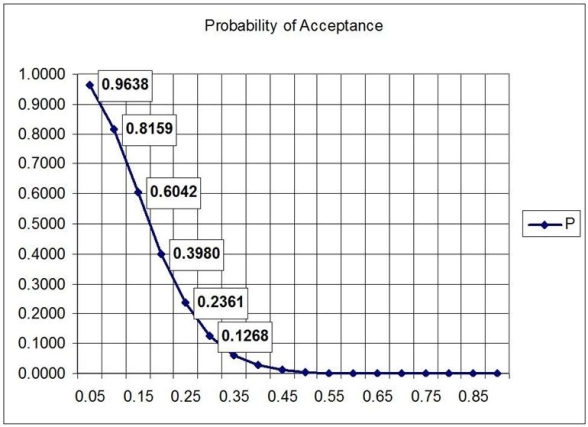
A) less than 0.06
B) greater than or equal to 0.06 but less than 0.07
C) greater than or equal to 0.07 but less than 0.08
D) greater than or equal to 0.08

A) less than 0.06
B) greater than or equal to 0.06 but less than 0.07
C) greater than or equal to 0.07 but less than 0.08
D) greater than or equal to 0.08

Unlock Deck
Unlock for access to all 87 flashcards in this deck.
Unlock Deck
k this deck
67
A quality manager has established a sampling plan that calls for a sample size of 75 units from a shipment of 5,000 pieces and an acceptance number of 2. The supplier has agreed to a contract that calls for an AQL of 0.02 and an LTPD of .04. What is the AOQ if the actual percentage of defectives in the lot is 2%? Table G.1 is appended to this exam.
A) less than 0.014
B) between 0.014 and 0.018
C) between 0.018 and 0.022
D) greater than 0.022
A) less than 0.014
B) between 0.014 and 0.018
C) between 0.018 and 0.022
D) greater than 0.022

Unlock Deck
Unlock for access to all 87 flashcards in this deck.
Unlock Deck
k this deck
68
This OC curve represents a sampling plan developed for a lot size of 500, a sample size of 15, and an acceptance number of 2. The probability of acceptance for each of the first six points appears next to the plotted point. What is the average outgoing quality limit? 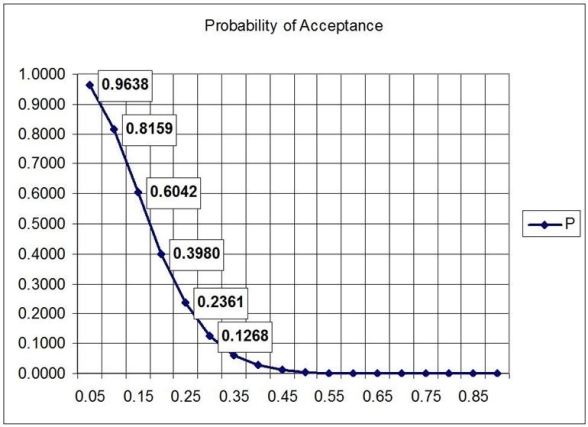
A) less than 0.08
B) greater than or equal to 0.08 but less than 0.09
C) greater than or equal to 0.09 but less than 0.10
D) greater than or equal to 0.10

A) less than 0.08
B) greater than or equal to 0.08 but less than 0.09
C) greater than or equal to 0.09 but less than 0.10
D) greater than or equal to 0.10

Unlock Deck
Unlock for access to all 87 flashcards in this deck.
Unlock Deck
k this deck
69
The AOQL is the highest point in the plot of AOQ over all possible values of the proportion defective.

Unlock Deck
Unlock for access to all 87 flashcards in this deck.
Unlock Deck
k this deck
70
A single-sampling plan using a sample size of 50 on a lot size of 2,000 has the following performance: 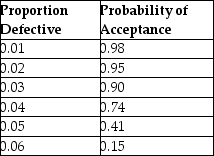
Today the company making the purchase receives two lots of 2,000 items and the inspection department is in a big hurry. Which action will result in an identical AOQL for the purchasing company?
A) Take a random sample of 25 from each lot and accept or reject both lots based on the results.
B) Take a random sample of 50 from one lot and accept or reject the second lot based on the first lot's results.
C) Take a random sample of 100 from one lot and accept or reject the second lot based on the first lot's results.
D) Take a random sample of 50 from each lot and accept or reject each lot based on the results.

Today the company making the purchase receives two lots of 2,000 items and the inspection department is in a big hurry. Which action will result in an identical AOQL for the purchasing company?
A) Take a random sample of 25 from each lot and accept or reject both lots based on the results.
B) Take a random sample of 50 from one lot and accept or reject the second lot based on the first lot's results.
C) Take a random sample of 100 from one lot and accept or reject the second lot based on the first lot's results.
D) Take a random sample of 50 from each lot and accept or reject each lot based on the results.

Unlock Deck
Unlock for access to all 87 flashcards in this deck.
Unlock Deck
k this deck
71
A sample of 100 items is randomly selected from a shipment of incoming materials. AQL and LTPD have been established at 0.01 and 0.07, respectively. When four or more defective items are found in a sample, the shipment is rejected. What is the value of β? Table G.1 is appended to this exam.
A) less than or equal to 0.05
B) greater than 0.05 but less than or equal to 0.10
C) greater than 0.10 but less than or equal to 0.15
D) greater than 0.15
A) less than or equal to 0.05
B) greater than 0.05 but less than or equal to 0.10
C) greater than 0.10 but less than or equal to 0.15
D) greater than 0.15

Unlock Deck
Unlock for access to all 87 flashcards in this deck.
Unlock Deck
k this deck
72
Increasing c while holding n constant decreases the ________ risk and increases the ________ risk.

Unlock Deck
Unlock for access to all 87 flashcards in this deck.
Unlock Deck
k this deck
73
Rectified inspection occurs when all defective items in the lot are replaced with good items if the lot is rejected and any defective items in the samples are replaced if the lot is accepted.

Unlock Deck
Unlock for access to all 87 flashcards in this deck.
Unlock Deck
k this deck
74
A single-sampling plan has the following performance: 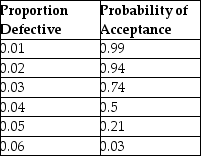
What is the average outgoing quality limit if the sample size is 200 and the lot size is 6,000?
A) less than or equal to 0.0200
B) greater than 0.0200 but less than or equal to 0.0220
C) greater than 0.0220 but less than or equal to 0.0230
D) greater than 0.0230

What is the average outgoing quality limit if the sample size is 200 and the lot size is 6,000?
A) less than or equal to 0.0200
B) greater than 0.0200 but less than or equal to 0.0220
C) greater than 0.0220 but less than or equal to 0.0230
D) greater than 0.0230

Unlock Deck
Unlock for access to all 87 flashcards in this deck.
Unlock Deck
k this deck
75
A rectified inspection plan requires that:
A) a rejected lot be returned to the supplier.
B) a rejected lot be subjected to 100% inspection.
C) a sample with too many defectives be returned to the lot for mixing and resampling.
D) all units in the sample be returned to the lot if it is rejected.
A) a rejected lot be returned to the supplier.
B) a rejected lot be subjected to 100% inspection.
C) a sample with too many defectives be returned to the lot for mixing and resampling.
D) all units in the sample be returned to the lot if it is rejected.

Unlock Deck
Unlock for access to all 87 flashcards in this deck.
Unlock Deck
k this deck
76
A single-sampling plan by attributes is needed for a purchased component. Given the following information, what is the producer's risk? Table G.1 is appended to this exam. Sample size = 125
Acceptance number (c) = 4
Acceptance quality level (AQL) = 0.02
Lot tolerance proportion defective (LTPD) = 0.07
A) )06
B) )11
C) )16
D) )21
Acceptance number (c) = 4
Acceptance quality level (AQL) = 0.02
Lot tolerance proportion defective (LTPD) = 0.07
A) )06
B) )11
C) )16
D) )21

Unlock Deck
Unlock for access to all 87 flashcards in this deck.
Unlock Deck
k this deck
77
A lot of 1,000 items is on the loading dock. A single-sampling plan calls for a sample size of 10. The following table gives the probability of acceptance for the plan over a range of possible quality levels. 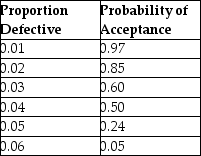
What is the average outgoing quality limit for this plan?
A) less than or equal to 0.018
B) greater than 0.0180 but less than or equal to 0.0200
C) greater than 0.0200 but less than or equal to 0.0220
D) greater than 0.0220

What is the average outgoing quality limit for this plan?
A) less than or equal to 0.018
B) greater than 0.0180 but less than or equal to 0.0200
C) greater than 0.0200 but less than or equal to 0.0220
D) greater than 0.0220

Unlock Deck
Unlock for access to all 87 flashcards in this deck.
Unlock Deck
k this deck
78
The average outgoing quality (AOQ) is the:
A) proportion of defectives that the sampling plan will allow to pass.
B) proportion of non-defectives that the sampling plan will allow to pass.
C) highest proportion of defectives that the sampling plan will allow to pass.
D) lowest proportion of defectives that the sampling plan will allow to pass.
A) proportion of defectives that the sampling plan will allow to pass.
B) proportion of non-defectives that the sampling plan will allow to pass.
C) highest proportion of defectives that the sampling plan will allow to pass.
D) lowest proportion of defectives that the sampling plan will allow to pass.

Unlock Deck
Unlock for access to all 87 flashcards in this deck.
Unlock Deck
k this deck
79
A single-sampling plan by attributes is needed for a purchased component. Given the following information, what is the consumer's risk? Table G.1 is appended to this exam. Sample size = 125
Acceptance number (c) = 4
Acceptance quality level (AQL) = 0.02
Lot tolerance proportion defective (LTPD) = 0.07
A) )057
B) )061
C) )065
D) )069
Acceptance number (c) = 4
Acceptance quality level (AQL) = 0.02
Lot tolerance proportion defective (LTPD) = 0.07
A) )057
B) )061
C) )065
D) )069

Unlock Deck
Unlock for access to all 87 flashcards in this deck.
Unlock Deck
k this deck
80
A single-sampling plan by attributes is needed for a purchased component. Table G.1 is appended to this exam.
Sample size = 100
Acceptance number (c) = 2
Acceptance quality level (AQL) = 0.01
Lot tolerance proportion defective (LTPD) = 0.04
Given the preceding information:
Sample size = 100
Acceptance number (c) = 2
Acceptance quality level (AQL) = 0.01
Lot tolerance proportion defective (LTPD) = 0.04
Given the preceding information:

Unlock Deck
Unlock for access to all 87 flashcards in this deck.
Unlock Deck
k this deck


